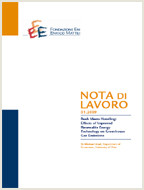“The Voracity Effect” and Climate Change: The Impact of Clean Technologies

Data
05.01.2011
05.01.2011
Autori
Hassan Benchekroun, Amrita Ray Chaudhuri
Codice JEL
Q20, Q54, Q55, Q58, C73
Q20, Q54, Q55, Q58, C73
Parole chiave:
Transboundary Pollution, Renewable Resource, Climate Change, Clean Technologies, Differential Games
Transboundary Pollution, Renewable Resource, Climate Change, Clean Technologies, Differential Games
Publisher
Climate Change and Sustainable Development
Climate Change and Sustainable Development
Editor
Carlo Carraro
Carlo Carraro
We show that a technological breakthrough that reduces CO2 emissions per output can exacerbate the climate change problem: countries may respond by raising their emissions resulting in an increase of the stock of pollution that may reduce welfare. Using parameter values based on empirical evidence we obtain that any ‘new technology’ that reduces the emissions of CO2 per dollar of GDP by less than 76% from their current level is welfare reducing. Developing clean technologies as well as transferring “cleaner” technologies to developing countries make a global post-Kyoto agreement over the control of emissions all the more urgent.
